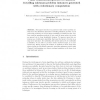Free Online Productivity Tools
i2Speak
i2Symbol
i2OCR
iTex2Img
iWeb2Print
iWeb2Shot
i2Type
iPdf2Split
iPdf2Merge
i2Bopomofo
i2Arabic
i2Style
i2Image
i2PDF
iLatex2Rtf
Sci2ools
133
click to vote
PPSN
2004
Springer
2004
Springer
Phase Transition Properties of Clustered Travelling Salesman Problem Instances Generated with Evolutionary Computation
Abstract. This paper introduces a generator that creates problem instances for the Euclidean symmetric travelling salesman problem. To fit real world problems, we look at maps consisting of clustered nodes. Uniform random sampling methods do not result in maps where the nodes are spread out to form identifiable clusters. To improve upon this, we propose an evolutionary algorithm that uses the layout of nodes on a map as its genotype. By optimising the spread until a set of constraints is satisfied, we are able to produce better clustered maps, in a more robust way. When varying the number of clusters in these maps and, when solving the Euclidean symmetric travelling salesman person using Chained Lin-Kernighan, we observe a phase transition in the form of an easy-hard-easy pattern.
Distributed And Parallel Computing | Euclidean Symmetric Travelling | PPSN 2004 | Symmetric Travelling Salesman | Travelling Salesman Problem |
| Added | 02 Jul 2010 |
| Updated | 02 Jul 2010 |
| Type | Conference |
| Year | 2004 |
| Where | PPSN |
| Authors | Jano I. van Hemert, Neil Urquhart |
Comments (0)

